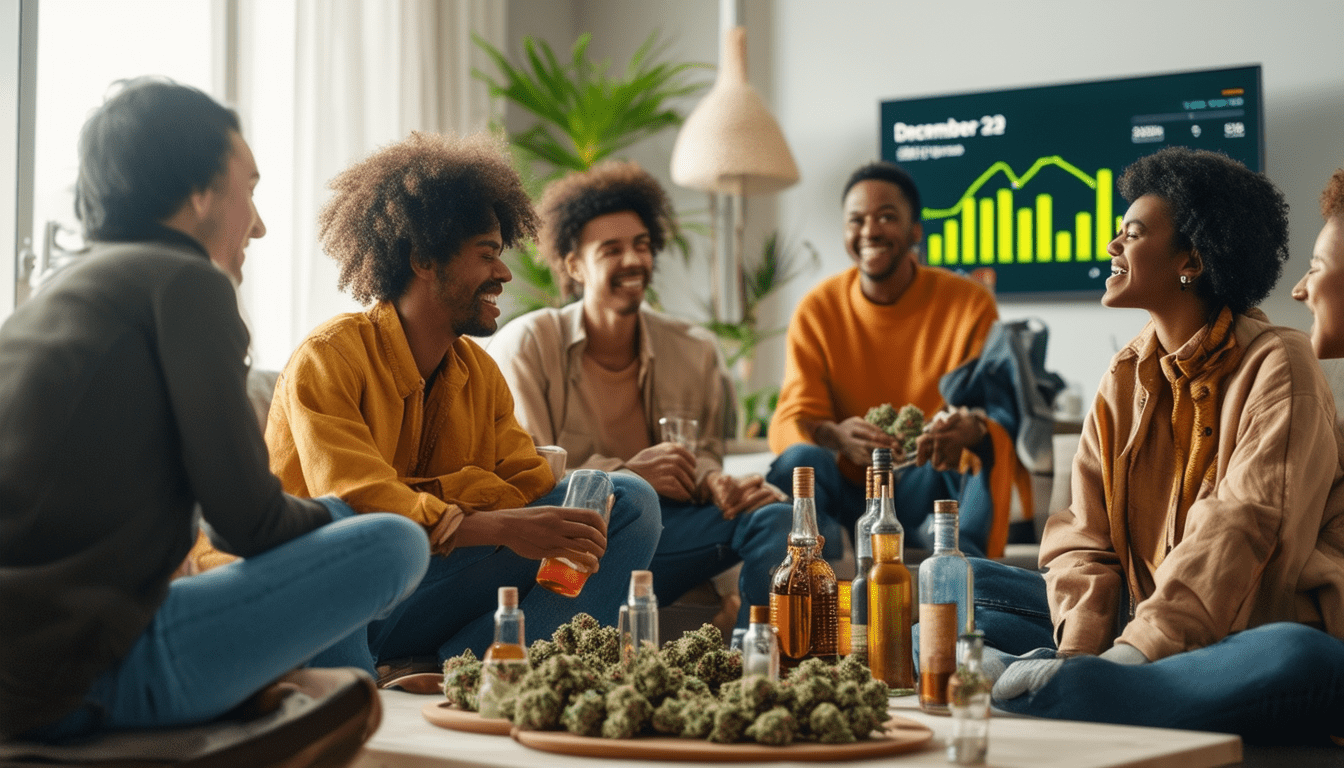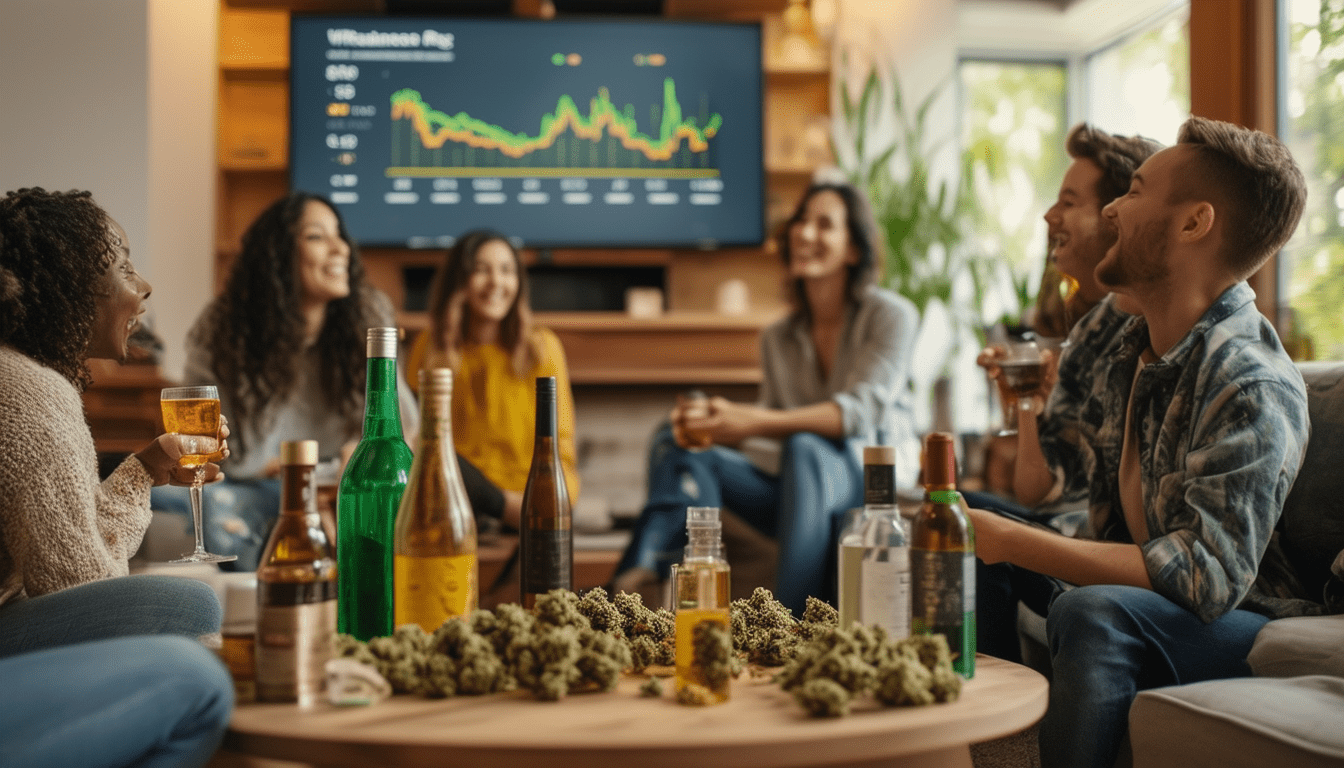Surge in Cannabis Use as an Alternative to Alcohol: Trends from December 2024
|
IN BRIEF
|
The rising trend of cannabis use as an alternative to alcohol has become increasingly evident, particularly in recent months. As societal perceptions shift and legal landscapes evolve, a growing number of individuals are turning to cannabis products for recreational purposes, seeking the benefits they provide without the adverse effects associated with alcohol consumption. Reports indicate a notable increase in substitution, with a significant portion of the population exploring cannabis as a viable option for relaxation and enjoyment. This shift not only reflects changing consumer preferences but also prompts a deeper examination of the potential implications on public health and safety.

The landscape of consumer preferences is shifting dramatically, as evidenced by the rising trend of cannabis use as a substitute for alcohol. Recent data from December 2024 highlights a significant increase in individuals choosing marijuana over alcohol, reflecting a broader cultural shift towards more health-conscious and less harmful alternatives for recreation and relaxation. This analysis explores the motivations behind this trend, key developments in cannabis legislation, and potential implications for both industries moving forward.
Key Drivers of the Trend
Several factors contribute to the increasing preference for cannabis over alcohol. Societal attitudes towards both substances are evolving, with consumers increasingly recognizing the health risks associated with alcohol consumption. Reports indicate that many individuals perceive cannabis as a safer option, especially with the rise in awareness regarding alcohol’s long-term effects on physical and mental health.
Furthermore, a survey conducted by Bloomberg Intelligence revealed a “sudden spike” in the adoption of cannabis, with a significant portion of respondents indicating they now use marijuana instead of alcohol, cigarettes, and even prescription painkillers. This shift is a testament to the growing acceptance of cannabis as a legitimate alternative for both social and individual consumption.
Legal Developments and Market Growth
The surge in cannabis use is paralleled by substantial legal advancements. In 2024, numerous states reported significant policy changes that both facilitated and legitimized the cannabis industry. For example, several states moved forward with legalization ballot measures and reform legislation, while the market for cannabis beverages is projected to grow at a remarkable pace of 19.2% annually, reaching an estimated $3.8 billion by 2030.
Such developments indicate a burgeoning compliance and integration of cannabis into the mainstream economy. According to reports, adult-use cannabis is legal in 24 states, reflecting shifting public opinion, which shows a historic support rate of 70% for legalization initiatives. These legislative changes not only address consumer demand but also create a more structured and regulated environment for cannabis production and sale.
Cannabis as a Healthier Social Option
The cultural shift towards cannabis is not solely driven by legal acceptance; it also represents a transformation in how people view social interactions. While alcohol has traditionally been the go-to substance for social gatherings, increasing numbers of consumers are gravitating toward cannabis, seeing it as a healthier option for relaxation and socializing.
As this trend gains traction, businesses are responding by developing innovative cannabis products aimed at the social market. THC drinks have gained popularity, positioning themselves as breezy, low-calorie alternatives to traditional alcoholic beverages. The increasing availability of these products signals a wider acceptance within various social spheres, particularly among younger demographics who prioritize wellness and healthy living.
Implications for Alcohol and Cannabis Industries
The rising preference for cannabis poses potential challenges for the alcohol industry, as it grapples with declining sales in certain markets. As more consumers opt for cannabis, companies within the alcohol sector may need to adapt by diversifying their portfolios or exploring collaborations with the cannabis industry.
On the other hand, the cannabis industry stands to benefit immensely from the shift. With the increase in demand comes a greater opportunity for economic contributions, innovation, and job creation. As businesses look to capitalize on this newfound preference, ongoing research into the effects and benefits of cannabis remains crucial. Both industries will need to navigate this evolving landscape carefully.
Inspection of Regulatory Changes
Many of the federal and state-level regulatory changes in 2024 addressed the cannabis market directly, enabling growth while ensuring consumer safety. For instance, regulatory bodies have established focus groups to tackle challenges related to cannabis banking, thus streamlining financial practices that have historically plagued the industry. The establishment of these groups signifies a commitment to refining the ecosystem surrounding cannabis, which in turn, provides a more dependable environment for business expansion and consumer engagement.
As cultural attitudes shift and the regulatory landscape evolves, the surge in cannabis use as an alternative to alcohol signals an important change in consumer behavior. Understanding these trends will be essential for stakeholders in both industries as they look to adapt and respond to the dynamics of this new reality.
Trends in Cannabis Use as an Alternative to Alcohol
| Aspect | Description |
| Demographic Shift | Increased preference among younger adults, particularly in urban areas. |
| Daily Use Rates | Report indicates daily cannabis use now surpasses alcohol consumption. |
| Market Growth | Cannabis beverage sector projected to grow significantly, reaching $3.8 billion by 2030. |
| Health Perceptions | Growing belief that cannabis is a healthier option compared to alcohol. |
| Substitution Rates | Notable shift where consumers are replacing alcohol with cannabis products. |
| Legislative Support | Increased legalization leading to more accessible cannabis products in many states. |
| Cultural Acceptance | Societal norms evolving, with cannabis being celebrated in social settings. |
| Market Variability | Diverse product offerings cater to different consumer preferences. |
| Consumer Awareness | Rising education on safe cannabis consumption parallels alcohol consumption declines. |

As we close the year 2024, a striking trend has emerged indicating a notable increase in the utilization of cannabis as a preferred alternative to alcohol. Recent surveys indicate that nearly 44% of Americans now favor cannabis over traditional alcoholic beverages. This transition not only signals changing consumer preferences but also opens up discussions around health, wellness, and societal norms surrounding substance use.
Growing Preference for Cannabis Over Alcohol
Data analysis reveals a significant shift in consumer habits, with an uptick in individuals opting for cannabis instead of alcohol. As awareness of the effects of alcohol continues to grow, people are seeking healthier lifestyles and alternatives that align with their well-being goals. These changes are particularly pronounced among younger demographics, who are leading the charge in prioritizing marijuana over conventional drinking.
Impact of Legislation on Cannabis Use
The evolving legal landscape plays a crucial role in the increased popularity of cannabis. With adult-use cannabis now legal in 24 states, access to marijuana products has significantly improved. This development not only enhances convenience but also normalizes the use of cannabis, encouraging individuals to try it as a substitute for alcohol. Moreover, emerging legislation related to cannabis regulation continues to foster consumer confidence, making the alternative even more appealing.
Market Potential and Economic Implications
Market analysts project a substantial economic impact from cannabis, with an expected growth of the industry to around $3.8 billion by 2030. The surge in demand for cannabis-infused beverages illustrates this trend, as beverage companies begin to pivot towards creating non-alcoholic alternatives. This market shift aligns with growing consumer focus on health, sustainability, and mindfulness in their consumption behaviors.
The Role of CBD in Mental Health
Interestingly, the conversation surrounding cannabis extends beyond mere recreational use. The recognition of CBD as a potential antidepressant is gaining traction, further solidifying cannabis’s role in health and wellness. A recent scientific review highlighted CBD’s therapeutic properties, pointing toward its capability to alleviate symptoms of depression with minimal side effects. As mental health awareness rises, cannabis emerges as a promising candidate for those seeking alternative treatments.
Shifting Cultural Attitudes Toward Substance Use
With the increasing acceptance of cannabis as a legitimate and safe alternative to alcohol, societal attitudes towards substance use are undoubtedly evolving. This cultural shift reflects broader changes in how communities approach health and wellness, presenting an opportunity for ongoing discussions about responsible consumption. As cannabis continues to establish itself in the market, adjusting to these evolving perspectives will be essential for both consumers and industry stakeholders.
As we move into 2025 and beyond, it remains essential to monitor how these trends will shape health practices and social behaviors. The implications of this shift could resonate long into the future, influencing everything from policy decisions to personal choices about consumption.
- Consumer Preference: Increased shift from alcohol to cannabis, with a rise from 33% to 44% of adults preferring cannabis.
- Daily Usage Rates: Daily marijuana users now surpass daily alcohol drinkers, with 17.7 million cannabis users compared to 14.7 million for alcohol.
- Market Growth: Projections indicate a growth of cannabis beverage market at a CAGR of 19.2%, reaching $3.8 billion by 2030.
- Legality Expansion: Adult-use cannabis now legal in 24 states, reflecting changing attitudes towards cannabis.
- Health Perception: Growing awareness of potential health benefits of cannabis compared to the adverse effects of excessive alcohol consumption.
- CBD Popularity: Increasing interest in CBD as an alternative for mental health and well-being.
- Cultural Shift: Cannabis is increasingly seen as a socially acceptable lifestyle choice, akin to alcohol.
Surge in Cannabis Use as an Alternative to Alcohol: December 2024 Trends
In recent months, there has been a remarkable increase in the use of cannabis as an alternative to alcohol across the United States. Analysts have noted a significant shift in consumer preferences, with many individuals opting for marijuana over traditional alcoholic beverages. This trend not only highlights changing societal perceptions of cannabis but also raises essential considerations for public health and regulation. Understanding these dynamics can guide policymakers and health professionals in addressing this evolving landscape.
The Shift in Consumer Preferences
The transitioning consumer base favoring cannabis over alcohol is gaining traction. According to a recent analysis, there has been a sudden spike in the substitution of marijuana for alcohol, with surveys revealing that a substantial percentage of Americans are increasingly choosing cannabis options. This indicates a cultural shift that reflects broader societal acceptance of recreational and medicinal cannabis use. Many individuals cite reasons such as enhanced social experiences, fewer side effects, and reduced hangover symptoms as motivating factors for this change.
Health Benefits of Cannabis Consumption
One driving force behind the growing preference for cannabis is its perceived health benefits compared to alcohol consumption. Numerous studies have suggested that cannabis, particularly components like CBD, may offer therapeutic effects, including anxiolytic and antidepressant properties. These insights provide a compelling argument for cannabis as a healthier alternative for those who seek to unwind or socialize without the negative impacts associated with alcohol.
Impact on Public Health and Safety
As the popularity of cannabis as an alcohol substitute rises, public health implications must be considered. The shift could potentially reduce alcohol-related harm, including intoxication and associated health risks. However, the increased consumption of cannabis does pose new challenges, including the potential for impaired driving and unexpected health consequences among novice users. Education about responsible cannabis use will be crucial in managing these emerging risks as consumers navigate their choices.
Market Evolution and Economic Impact
The cannabis industry is witnessing a surge in market growth. Projected revenues indicate a considerable rise in cannabis sales, which directly corresponds with the increasing consumer interest in marijuana as an alternative to alcohol. Established alcohol brands are beginning to explore cannabis-infused beverages, lending legitimacy to this evolving market while potentially shifting the dynamics of consumer spending in favor of cannabis products.
Legislative Considerations
With changing public sentiment, there are increasing calls for legislative reform to accommodate this growing trend. Policymakers should assess existing regulations and consider updates that reflect the changing landscape of cannabis use. This could involve revising tax structures, establishing safety protocols, and ensuring accessible education regarding responsible consumption. The aim should be to support a market that prioritizes consumer safety while promoting healthy lifestyle choices.
The Role of Education and Advocacy
Education plays a vital role in shaping perceptions and behaviors surrounding both cannabis and alcohol use. Public awareness campaigns can inform individuals about the benefits and risks of choosing cannabis over alcohol, emphasizing moderation and responsible consumption. Advocacy groups have an opportunity to drive these initiatives, ensuring that individuals can make informed decisions based on the latest scientific evidence and personal health considerations.
FAQ: Surge in Cannabis Use as an Alternative to Alcohol (December 2024)
A: Analysts have noted a significant sudden spike in the substitution of cannabis for alcohol among Americans.
A: A recent survey indicated that a considerable portion of Americans now prefer using cannabis over traditional alcohol beverages.
A: Various factors, including health considerations and changing cultural norms, are driving individuals to seek cannabis as a safer alternative to alcohol.
A: Younger adults and those concerned about health risks associated with alcohol consumption are notably leading this shift towards cannabis use.
A: The rise of cannabis as an alternative may challenge the alcohol industry, compelling them to adapt by expanding their product lines to include cannabis-infused beverages.
A: Emerging research suggests that cannabinoids, particularly CBD, may offer various therapeutic benefits without the adverse side effects typical of alcohol consumption.
A: There is a growing acceptance of cannabis use, reflecting a cultural shift that views cannabis as a legitimate lifestyle choice rather than a taboo.





Post Comment